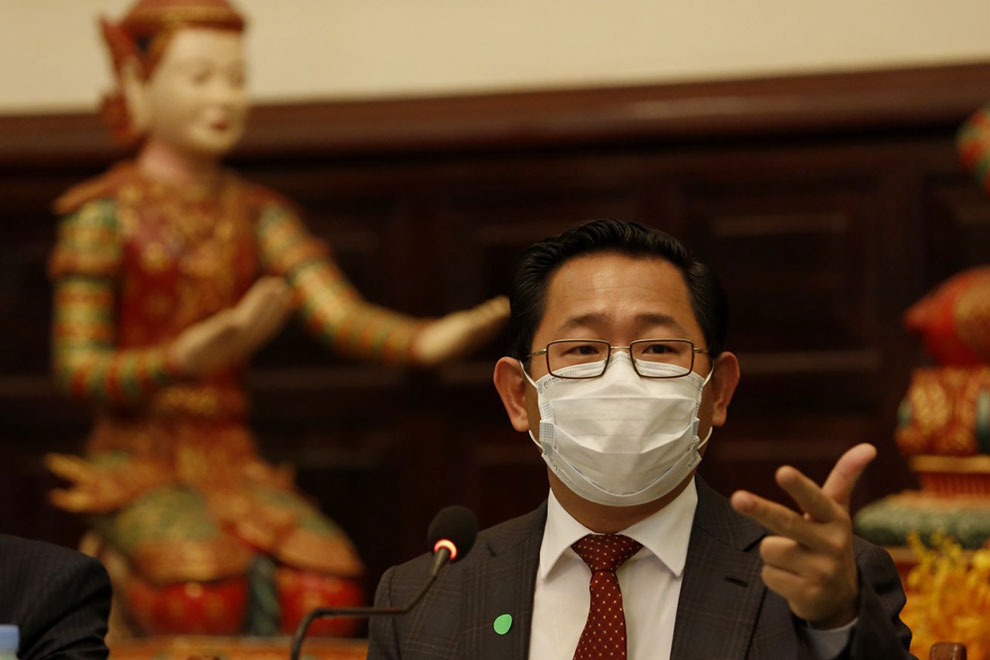New Justice Minister Koeut Rith pledged on Monday to prioritize clearing the growing backlog of cases before Cambodia’s courts, blaming campaigns against minor drug and environmental crimes for putting offenders into the legal system at a faster rate than prosecutors and prisons can handle.
Rith replaced Justice Minister Ang Vong Vathana — who had been in the role for more than 15 years — in the government’s cabinet reshuffle in March, which was promoted by Prime Minister Hun Sen as a sign of coming reform.
Speaking at a press conference in Phnom Penh, Rith said the recent campaigns against environmental and drug crimes had been almost too effective in arresting accused wrongdoers, with a tardy and bureaucratic legal system overwhelmed.
“Over about the past two years, there have been nearly 30,000 drug cases in the campaign against drug crimes, with nearly 60,000 arrests, including some people who were users and were sent to rehab centers, and some [in production and distribution] who were sent to the courts for action to be taken,” Rith said.
But he said that the courts had not kept up the pace of arrests, with prosecutors often sending minor cases for extensive examination by investigating judges while the accused wait in pre-trial detention. He said that present figures showed some 12,651 people in prison awaiting trial.
“I give the example of just the Phnom Penh Municipal Court: there are 1,200 cases that remain, and about 700 to 900 new cases each month,” Rith explained, adding that a single judge could handle, on average, just 129 cases per year.
“The judges work hard, but they are no match for the increasing new cases.”
Justice Ministry secretaries of state Kim Santepheap, Chiv Songhak, Long Norinn, and Chin Malin would be placed in charge of the push, Rith said. They would be tasked with three main goals: to push the courts to speed up their procedures to clear existing cases; to help the courts to more quickly process new cases that come before them; and, ultimately, to reduce the number of new inmates going into Cambodia’s overcrowded jails.
While the ministry officials “will not interfere with the decisions and independence” of the courts, there were some obvious fixes that could still be made. For one, many cases now being sent for extensive investigation could be heard immediately by judges, with court supervision orders — such as bail or supervised parole — being used, “instead of pre-trial detention for misdemeanor cases, which is not necessary.”
Spokespeople for the provincial courts said they believed the reforms would be helpful.
Siem Reap Provincial Court spokesman Yin Srang said his court did not have a backlog because it had always worked efficiently — but added that he welcomed any reforms aimed at processing cases faster.
“Even though [it may not be needed in Siem Reap], I think this campaign to resolve the backlog of cases is good to help out the provincial courts,” Srang said. “The Siem Reap court will work hard to operate on the basis of the law.”
Kandal Provincial Court spokesman So Sarin acknowledged a backlog of cases at his court. He said the situation was not too bad, though, and that the number of pending cases could be reduced quickly.
“For the Kandal Provincial Court, we will announce the start of the campaign to resolve the backlog of court cases on May 22,” Sarin said. “It’s good that the Justice Ministry is taking measures like this.
However, other concerns about the large number of cases before the courts remain.
Asked at his press conference if he acknowledged that part of the cause of the problem was court officials requiring “unofficial fees” to process cases, Rith said that he did not believe such a problem was widespread. However, not everyone remains convinced that backlog problem is purely a matter of slow bureaucratic processes.
Pech Pisey, executive director of Transparency International Cambodia, said a more comprehensive approach to examining why courts were taking so long to process cases could help the government resolve the issue faster.
“The push to reduce the backlog of court cases by the Ministry of Justice is a good thing,” Pisey said when asked of Rith’s new campaign. “However, if the Ministry of Justice was a bit open-minded and let NGOs or some independent institutions join as the eyes as noses of the campaign, that would be better.”
Still, he said that he believed the directive to move away from knee-jerk pre-trial detention towards bail for accused criminals was welcome.
“That’s a good point,” he said. “Every country in the world has been implementing this measure.”
Ny Sokha, head of monitoring at local rights group Adhoc, also said he backed the reforms.
But he said that the reforms were long overdue and that more questions still remained about powerful figures weaponizing the legal system and prison sentence against their perceived foes.
“We support this campaign, but it seems a little bit late because court cases have been backlogged since a long time ago,” Sokha said, explaining there were many cases of pre-trial detention used in low-risk cases. “Especially for the cases that involve political, human rights, environmental or land activists, the courts should be allowing them out on bail.”
Am Sam Ath, the deputy director of Licadho, another local rights group, also said that he supported Rith’s moves but added that many cases that have put such activists in pre-trial detention should have never been before the system in the first place.
“The campaign will help reduce the backlog of court cases and also help reduce the overcrowding of inmates,” he said. “Nevertheless, we must implement the law correctly to avoid corruption, and there has to be transparency and fairness.”








